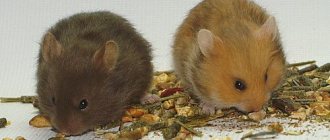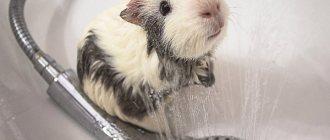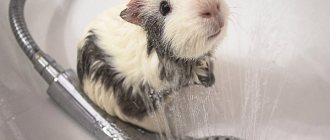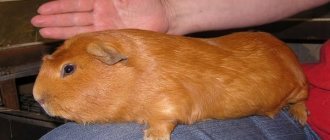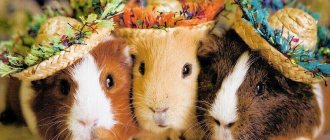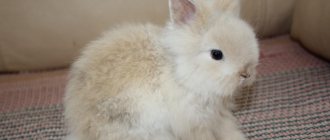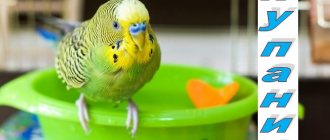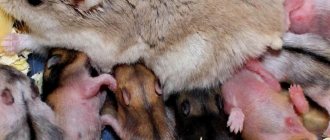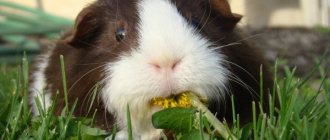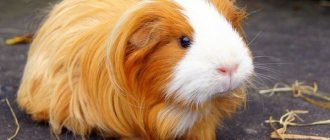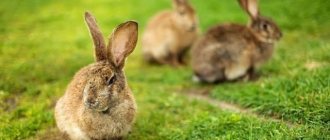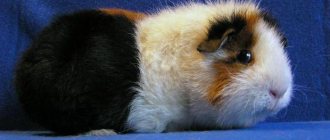Maine Coons are freedom-loving and independent animals, which is why many people believe that they cannot be trained. This is not entirely true - the standard process of education and training applied to dogs simply does not suit Maine Coons. These cats are smart, sociable and have a stable psyche, so all that is required from the owner is to find the right approach to raising a pet.
Education at home
Maine Coons are not unteachable animals, but in order for a small kitten to grow up to be an obedient pet, it needs to be raised from an early age. The breeders in the nursery are also involved in training the litter box and scratching post, where the kitten begins to socialize. After the Maine Coon moves to a new home, the owner needs to clearly define the boundaries of what is permitted for the pet and patiently explain to him the rules of behavior.
What is allowed to a kitten will also be allowed to an adult animal: it is almost impossible to wean an adult Maine Coon from anything.
The easiest way to find a common language with your pet is to use the method of prohibitions and rewards. With correct behavior on the part of the owner, raising a Maine Coon becomes not a routine, but an exciting activity.
Promotion
How to raise a Maine Coon to be an affectionate pet? Be sure to reward your pet for good behavior. It is important for Maine Coons to hear that they are praising them and to understand that they are happy with them. Cats love affection very much, they try to earn it, so they will try to behave well. When you teach your cat commands, you can use treats as a reward.
Common problems
The main problems that you may encounter when raising a Maine Coon and how to solve them:
- The cat goes to the toilet in the wrong place - sit the pet next to a puddle, sternly say “No!”, and then take him to the litter box.
- The Maine Coon climbs into places where it is forbidden, for example, on a table - spray water into it from a spray bottle. This action is unpleasant for the cat; it will serve as a kind of stop signal.
- The pet scratches the furniture, ruins the curtains with its claws - use a spray bottle, sternly say “No!”
Also often noted is the tendency of Maine Coons to chew on wires, which can be not only unpleasant, but also dangerous due to the risk of a short circuit. If it is impossible to hide the wiring, you should spray it with citrus juice - this smell is unpleasant for cats.
How to educate?
During the first days in a new place, the pet must learn to go to the litter box according to its needs.
A Maine Coon kitten is taught a culture of behavior from childhood, otherwise it will grow up to be a big, whimsical cat that brings trouble, with no idea what is possible and what is not. For comfortable coexistence between the pet and its residents, the coon is trained to use a litter tray from the day of relocation. So that the animal understands where to relieve itself, it is better to carry the pet in your arms the first time and wait until it copes with its business. A friendly bond is formed in the next 2-3 days, this time is the most important, it is worth paying all your attention to the pet. Physical pressure on maines is prohibited; the animal will be offended and perceive the owner as an enemy. Maine is a smart enough creature to understand cause-and-effect relationships; in punishments it is worth focusing on this trait and “teaching a lesson” immediately at the moment the dirty trick is discovered. After an hour or two, the action is meaningless, the pet will not understand and will continue to do the same thing, only with greater impact.
Return to contents
Training
The cat is prone to following commands, remembers basic and complex settings, and learns easily and with interest. Several prohibitions on a certain action will be stored in memory and there will be no repetition of the negative action. The main way to wean young coons from “bad manners” is to spray their faces with a spray bottle of warm water. This will solve the problem of climbing on the table and stealing food from plates. Furniture is protected from scratches by attaching a sticky material (for example, double-sided tape) or by spraying with an aerosol that has an unpleasant odor for animals and a neutral odor for humans.
Training a Maine Coon at home is a responsible undertaking. You need to be patient and persevering.
The animal very quickly learns to give its paw to a person.
The command “give me your paw” is easily mastered by a cat, using encouragement as the main method of education. They carefully raise Maine's paw and pronounce the name of the trick. The second or third time, when you bring your open palm to the animal, it will offer its paw on its own. If successful, treat the student with a treat and repeat the procedure to consolidate the result. It is important that the pet must feel interested and take the initiative; you should not forcefully train it, it leads to the opposite consequences. Based on this base, the pet is taught any tricks.
Return to contents
Training and communication
Maine Coons are freedom-loving and independent, so you should not expect unquestioning obedience from them. However, this breed can be taught some commands and, more importantly, proper behavior around the house. First of all, it is necessary for the pet to remember its name and associate it with something pleasant, after which more intensive training should begin.
The most suitable way for Maine Coons to learn and consolidate skills is through play.
You need to take a closer look at your pet and understand what he likes - every cat has favorite activities and individual inclinations.
It is with the development of these talents and inclinations that it is worth starting, consolidating successes with affection and delicacies. One of the characteristics of Maine Coons is hunting for various objects. They love to carry toys in their teeth and often bring them to their owner’s feet, hinting at a desire to play. This trait can be developed and your pet can be taught to fetch thrown objects on command.
Another common command for training Maine Coons is to give the paw. To do this, you first need to carefully lift the paw of a sitting cat, making sure to accompany your actions with the command “Give me your paw” and treating the animal with a treat.
Then you should extend your palm, repeat the command and reward the pet if it is completed. If the cat does not respond to the command, the training should be repeated from the beginning, gradually strengthening the skill.
Who are Maine - Coon cats?!
Despite their wild appearance, Maine Coon cats are very affectionate and kind. They are loyal to their owner and wary of strangers.
The best thing that Maine (America) gave to the world is the American raccoon cat (Maine Coon). Due to their coat color, powerful build and huge tail, the animals look a little like raccoons.
Hence the name of this breed: Maine is the English name of the state, coon is the second part of the word racoon, which means “raccoon”. Maine Coons are the largest of the domestic cats and they get along well with dogs.
Characteristics of Maine Coon cats:
Despite their “wild” appearance, Maine Coons are very affectionate and kind animals.
They have a great need for affectionate love. They don't require too much space in the house. These cats love to play, but do not jump around the apartment, apparently considering this to be beneath their dignity.
Hyperactivity is observed only in childhood.
Caring for Maine Coon cats:
Maine Coon cats are very easy to care for. They do not need to be brushed as often as, for example, Persians, but you still need to make sure that the hair does not tangle or mat.
Maine Coons prefer both natural food and ready-made food; they are very fond of turkey and beef.
This is prohibited
It will not be possible to avoid absolutely all problems when raising a pet, since each Maine Coon is unique, and it is impossible to foresee everything in advance. It is important to know the basic principles of behavior in case of problems and adhere to them:
- The use of physical force is prohibited. You cannot hit a kitten with your hand or any other object; this will lead to the fact that it will not only grow up to be a fearful cat with an unstable psyche, but will also begin to see its owner as an enemy.
- You cannot punish for something that was done a long time ago. If the consequences of a pet’s prank were not detected immediately, then there is no point in scolding him a few hours later - he will not understand what caused the owner’s dissatisfaction.
- Praise more than punish. The kitten should be praised and encouraged even for the most insignificant successes, but scolded only for serious offenses.
It is important for Maine Coons to understand and feel that the owner is, first of all, a friend. In this case, cats try their best to please the owner.
Punishment word
A similar word could be “fu”. When your pet learns to understand the meaning of this word, you will not have to resort to other methods of disapproval. This word must be pronounced in a loud, unpleasant voice, looking the pet straight into the eyes.
Touch his nose with your finger. This gesture is considered to be an educational gesture by a mother cat.
If these measures do not help, you can pinch the cat by the ear or lightly spank it with a newspaper, but under no circumstances not with your hand. The punishment word should be unpleasant. It is important to remember that the pet must understand why he is being punished, then he accepts and understands it.
Temperament and aggressive behavior
The type of Maine Coon's temperament determines exactly how it will react to external stimuli. Among the representatives of this breed, sanguine and phlegmatic people are most often found. Both types have no problems with adaptation; they easily get used to new places and people. Inexperienced breeders find it a little more difficult to deal with choleric cats due to their hyperactivity and frequent mood swings.
A kitten is born with a certain temperament, which cannot be changed, but any cat can be trained to behave correctly.
Aggressive behavior can occur in the following situations:
- Disease. Often, when cats are ill, they do not hide in a secluded place, but try to show the owner that they feel bad and often do this by showing aggression.
- A game . Harmless games of kittens, during which they bite each other or the owner, over time can become a bad habit, which is why the Maine Coon will prove its leadership or achieve what it wants by behaving aggressively.
- Fear . A frightened animal seeks first of all to protect itself, and in such a situation, aggression and attack are the only suitable behavior options for a cat.
Also, representatives of this breed are prone to aggression when irritated, in case of violation of the boundaries of their territory and when clarifying relationships between several individuals.
Hisses
Hissing is most often a protective reaction of a cat to an external stimulus. Thus, a cornered animal, feeling threatened by a person or frightened by something, prepares to defend itself by hissing to warn of a possible attack. You should leave the Maine Coon alone and give him time to calm down and come to his senses. Later, you need to analyze the animal’s behavior, understand what provoked such a reaction and, if possible, get rid of the irritants.
Bites
Most often, the Maine Coon bites during the change of teeth and during puberty. In some individuals this habit goes away as they grow older, in others it does not. Therefore, before buying a kitten, you should find out about its parents and their temperament in order to have an idea of \u200b\u200bheredity and avoid buying an inadequate animal.
To wean your Maine Coon from biting, you need to:
- Buy your pet special treats that he can and should chew on.
- It is easy to shake the cat by holding it by the withers.
- Allowing the kitten to play as much as he wants, wasting his energy reserves.
- Ignore the Maine Coon for 20-30 minutes after the punishment.
You cannot hurt or injure your pet; all methods used must only affect the cat psychologically.
It is also important to ensure that the Maine Coon’s diet is balanced – a lack of vitamins and microelements leads to health problems, which also affects behavior.
Scratched
The only thing that a Maine Coon can and should scratch is a scratching post; if it is not there, the cat will find another object on which to sharpen its claws.
If a Maine Coon scratches its owner, it must be stopped immediately, letting him know who is the leader in the house.
First of all, you need to make it a rule that you can play with a kitten only with the help of sticks, strings and other toys, and not with your hands and feet. In cases where scratching is not the result of play, but a manifestation of aggression, you should punish the Maine Coon by spraying water on it, lightly hitting it on the nose, or pressing it to the floor or sofa until it calms down.
Meows constantly
Meowing is the Maine Coon's way of attracting the attention of its owner. In this way, the cat informs the owner about his desires or fears, attracts his attention, or simply communicates.
If your Maine Coon meows constantly, you need to:
- Make sure your pet is healthy and fed. If you suspect any disease, you need to contact a veterinarian, and if the cat is hungry, feed it, possibly increasing the portion size, and provide constant access to clean drinking water.
- Ignore. Often the animal simply sees a connection between meowing and the owner’s immediate reaction to it, so it uses this technique to attract attention. If the Maine Coon is healthy and well-fed, you should simply stop reacting to his meowing.
- Punish. Physical punishment is not acceptable, but you can spray the cat with warm water from a spray bottle or blow on his face.
To prevent night meowing, you need to play with your Maine Coon before going to bed, giving him the opportunity to get rid of accumulated energy, and feed him. All this will help your pet calm down and get ready for rest and sleep.
You should not hit a cat or yell at it - this will frighten the animal and cause other behavior problems.
Character traits
Distinctive features of cats of this breed:
- playfulness;
- accuracy;
- peacefulness;
- sociability;
- learning ability;
- adaptability;
- unpretentiousness.
It is worth noting that these qualities are both enhanced and suppressed in the process of education. It is necessary from the first days of moving the pet to a new place of residence. It is easier to raise an affectionate, playful cat, as well as teach it commands, if you tame it right away. Coons are easy to train, but general methods developed on dogs will not work.
Advantages and disadvantages
Playful and active. She loves children, is understanding, trainable, and has a phenomenal memory. She is obedient, easy to care for and gets along well with people. She gets along with children without problems and will not cause harm, even considering her large size, she will treat the baby carefully and condescendingly, and can become his devoted friend and protector.
It has a fairly long and thick coat. Problems arise without proper care and attention; wool spreads throughout the home, and especially collects on carpets and furniture. Having large sizes and weight (adults reach 1.2 m in length and up to 15 kg in weight), they can break household items through negligence, tear curtains and tulle. Without a scratching post, they damage wooden and upholstered furniture by tearing off the covering.
Behavior
Living with a Maine Coon, an attentive owner will notice changes in the animal’s behavior in a direction that is close to themselves. High intelligence and the ability to learn contribute to the transfer of the owner’s character traits to the cat’s behavioral characteristics. Great activity, curiosity, and playfulness are characteristic of young individuals. With age, the pet becomes calm and balanced. Likes to watch what is happening from above. The predator instinct is developed, the cat will catch pests in the house and destroy flies. He treats strangers with fear, but does not show aggression. Makes friends with a new person if he shows respect and friendliness.
Subsequence
How to raise a Maine Coon to be an obedient cat? It is very important to be consistent in the process of teaching him. If, for example, a Maine Coon persistently demands food (even though you recently fed it), and you still follow his lead, do not be further surprised by his similar behavior.
If your pet did a prank and you scolded it, then you should not immediately feel sorry for it. He will not understand that you punished him, and will continue to not comply with the owner's demands. Representatives of this breed are highly intelligent and aware, so with proper consistent training they quickly learn behavioral norms.
What not to do
Some actions should never be allowed, namely:
- Leaving a kitten alone with open windows may cause injury or escape;
- Scolding for actions, after a significant amount of time has passed, the pet simply will not understand why they are scolding him;
- Leave cords on the floor; your pet may chew them;
- Leave household chemicals within easy reach;
- Yelling at an animal; loud noises cause fear in a pet;
- Cause pain to the kitten.
Cats are headstrong animals; if you beat them, they will not forgive it.
Tricks
Cats are not dogs at all, but the Maine Coon breed can be trained to give a paw. To do this, you need to take the kitten’s paw several times a day, saying the command “Give me your paw.” After completing a specific task, the pet must be rewarded with a treat. Using the same technique, you can teach a kitten to approach its owner.
If the owner gives the kitten medication, it is important not to reward it with treats afterwards.
You should not overwork your animal with long-term training, as this causes fatigue and irritation. If your pet has learned a trick, you don’t have to constantly ask him to repeat it.
Even if the animal already responds well to commands, you need to reward it every time. But if he comes up and does something on his own, trying to beg for a treat, the owner should reward him in a different way. You can pet it. Otherwise, the animal will decide that it can perform tricks only when it wants to receive a reward.
